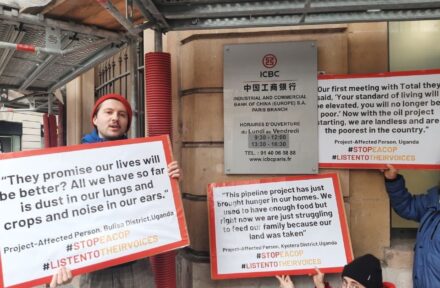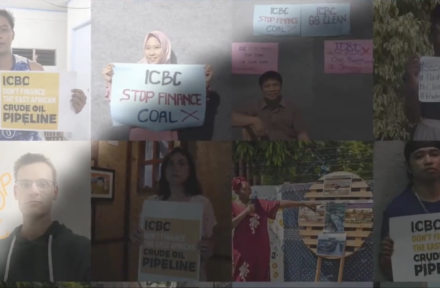By: 350 Türkiye
In the week of 23 March 2022, a whopping 1.5 million people gathered at the famous Orange Blossom Festival in Adana, Turkey. The most attractive guest at the gathering was a sea turtle.
This particular turtle expressed its opposition to the Hunutlu coal-fired thermal power plant project under construction on the Sugözü Coast, about 100 km from the center of Adana, which continues to threaten the protected green sea turtles’ nesting and feeding area.
The Hunutlu project is China’s largest direct investment in Turkey and is financed by the Industrial and Commercial Bank of China (ICBC) under the Belt and Road Initiative (BRI).
At the festival, the sea turtle took the chance to present its message to the people of Adana, and gathered messages of support and solidarity for the #CleanAir4Adana campaign. These messages will be forwarded to the Ministry of Environment, Urbanization, and Climate Change.
The protection of Adana’s Sugözü coastline is crucial in ensuring the continued existence of green sea turtles in the Mediterranean
The green sea turtle (C. mydas) is included in the International Union for Conservation of Nature’s (IUCN) Red List of threatened species. The beaches on the eastern Mediterranean shores of Turkey host 80% of the population of this species in the Mediterranean, and 91.5% of it in Turkey.
Not only will the Hunutlu coal power plant affect the Sugözü nesting site, it will disrupt the Mediterranean’s healthy ecosystem. The population of the green sea turtle throughout the Mediterranean has flourished because of effectively protected beaches in Turkey under three international conventions:
- The Bern Convention – Convention on the Conservation of European Wildlife and Natural Habitats
- The United Nations Convention on Biological Diversity
- The Barcelona Convention – Convention for the Protection of the Mediterranean Sea against Pollution
The project is already a “stranded asset”
The Hunutlu coal-fired thermal power plant project is China’s largest direct investment in Turkey, financed by the China Development Bank, Bank of China and ICBC as part of the Belt and Road Initiative. Once completed, the EMBA Hunutlu Coal-Fired Thermal Power Plant project, with an expected total capacity of 1320 MW with its two 660 MW units, will directly impact communities and ecosystems in the area:
- 2.8 million tonnes of coal will be imported each year.
- A second coal-fired thermal power plant situated only 1.8 km east of the Sugözü Import Coal-Fired Thermal Power Plant, which is located on the Sugözü coast and currently in operation, will be established.
- Sugözü Village, Herekli Neighbourhood, and Demirtaş Village, which are 1.5 km, 2.6 km, and 2.8 km away from the project, will be directly affected.
The economic feasibility study done in 2020 for the Emba Hunutlu power plant clearly shows that the power plant is not profitable economically. The study demonstrated that, even in the lowest cost, highest income scenario, the Hunutlu power plant would generate positive returns only 26 years after starting operation. Coal prices have tripled since last year, so the project has become even less profitable.
With an investment of 1.7 billion USD for Hunutlu, a 3700 MW Solar Power Plant (SPP) could be built. This way, a renewable power plant would have been built with an investment payback period of approximately 3.5 years with a more economical model.
Moreover, the Hunutlu coal power plant will harm biodiversity in Sugözü Beach and the people in the region through air pollution, and dishonor Turkey’s emission targets in the Paris Agreement. Worse, it is a power plant that can not be compensated for by its main investor, China.
The project comes at the cost of Adana’s clean air and the health and lives of its residents
ÇETKO Director Dr. Sadun Bölükbaşı – a member of the Eastern Mediterranean Environment Platform which launched the Clean Air for Adana campaign – stated that the toxins in the air are three times above the air pollution limits instated by the World Health Organization (WHO). He also mentioned that, “the newest analysis by Health and Environment Alliance (HEAL) states that the health cost of coal power plants in Adana is 114 billion Turkish Liras (€7.5 billion), and these led to 4 thousand premature deaths. Purely in terms of economics, when the feasibility study conducted under 2020 conditions is adapted to today’s situation, it is clear that the Hunutlu coal power plant will never pay for itself. The Hunutlu coal power plant project will poison the air, the water and the soil, will put public health at risk; it will increase Turkey’s reliance on coal amid the climate crisis, just when we need to put fossil fuels behind us. It is unacceptable.”
He continued, “The petition we started two years ago on Change.org was signed by over 113 thousand people from all over Turkey. We reiterate at the Orange Bloom Festival that we do not want another coal power plant in Adana, our ongoing demand in our years-long struggle. We say the scent of orange blossom is becoming of Adana, not the smell of soot. I wore the sea turtle costume and joined the festival parade, representing the campaign’s constituents. The costume was useful in creating awareness. It is important for the whole Mediterranean that we protect the green sea turtle in Turkey. All our efforts are so that the Hunutlu coal power plant will be stopped for clean air in Adana and for the protection of our future.”




